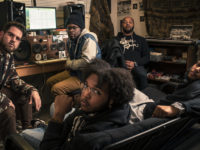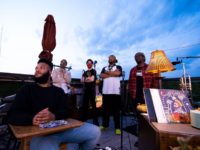We know that modern music forms like jazz, rock, hip-hop are descendants of older, more primitive music forms such as blues and ancient folk music from the far corners of the earth. Transcendence, the collaboration between Jaimeo Brown and Chris Sholar, has done a better job than anyone in cleverly demonstrating the connection between old and new by presenting them together simultaneously and the amalgam that results is some of the most enticing, provocative fusion heard in a while. Brown, a jazz drummer and composer, first called in the Grammy-winning producer, to help on the first Transcendence (2013), a game-changing album that proved what is possible when traditional forms of music are thrust to the cutting edge.
Work Songs (February 12, 2016 by Motéma Music) continues the plot, putting the focus on music borne out of manual labor, while once again meshing the real recordings of those vintage forms with the handmade Coltranian jazz of Brown with the assistance of JD Allen, Jaleel Shaw, Marcia Miget, and other instrumental masters. Alabama’s Gee’s Bend Quilt Collective as well as Lester Chambers, Falu are among the singers who lend a spiritual hand. Awash in atmospheric and sometimes trance-like electronics and electronic keyboards that cut against the grain of the frayed-edged music of ghosts, Brown and Sholar makes it more than a clash of styles, it’s a clash of sentiment.
Listen, for starters, to “Safflower,” a traditional Japanese cultural work canticle, where contemporary minor chords are slipped into the sample, totally transforming the song but not submerging it. Shaw offers up jazz expressions over a hip-hip groove, but a quick return to the Japanese verses is a span over centuries in a single turn. The same kind of inversion is done to the Hindustani work song “Stonemason,” though the culture referenced here is a world apart from that heard on “Safflower.”
“Be So Glad” is a prison field holler set to a piano ballad riff. A drum ‘n’ bass groove kicks in while the chant fades out and back into consciousness. Like an audial Escher sketch, two opposing figures of the same portrayal somehow fit together perfectly. An old African-American work song from the South forms the kernel for “Lazarus,” with Brown’s restless drums, Miget’s celestial flute and Brandon McCune’s organ wash going in another direction as Sholar’s electric guitar tries to bridge the two streams and Allen’s tenor sax drifts over it all. Alan Lomax recordings at Parchman Farm form the basis for another prison work song “Hidden Angel,” the prisoners’ chants melded with a vocal drone and Shaw’s quietly probing alto sax.
Brown and Sholar elevate sampling from art to high art, but sometimes sampling isn’t even needed. “Mississippi” is RL Burnside blues with Lester Chambers’ raw vocal, a country harmonica acoustic slide guitar alongside an over Sholar’s amped one. “2113” refers to a year far off in the future, at a train station on Mars. Over a chain gang beat, Allen’s tenor and Sholar’s fuzz guitar play the melody together, then split apart. And Gee’s Bend Quilt Singers add the early 20th century perspective on Brown’s trance “Happy Serving” and the shout of cotton pickers slowly morphing into rock-jazz on “The Valley.”
Through of grind of manual labor, inspiring music was birthed, a rich storytelling of human struggle, survival and, ultimately, freedom. Jaimeo Brown and Chris Sholar are able to make sense of it all and place it in the context of the present. Because of that, the second Transcendence record tops even the first one.
- Patrice Rushen – ‘Prelusion’ (1974, 2024 Remaster) - January 2, 2025
- Camila Nebbia, Dietrich Eichmann, John Hughes + Jeff Arnal – ‘Chrononaux’ (2024) - January 1, 2025
- [Ahmed] – ‘Wood Blues’ (2024) - December 31, 2024





This artist is one with an eye toward the future, while still drawing inspiration from the past. I was a sound designer on this project and it’s been a long time since meeting such a deeply honest artist. Jaimeo and Chris have their fingers on the pulse of NOW!!!